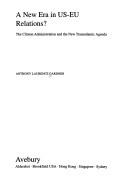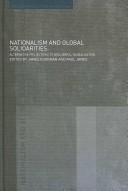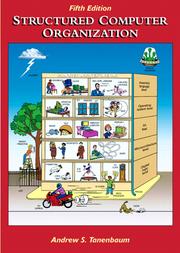| Listing 1 - 10 of 23 | << page >> |
Sort by
|

ISBN: 1859723969 Year: 1996 Publisher: Aldershot : Avebury,
Abstract | Keywords | Export | Availability | Bookmark
 Loading...
Loading...Choose an application
- Reference Manager
- EndNote
- RefWorks (Direct export to RefWorks)
Nationalism --- Nationalisme --- European Union --- Europe --- Politics and government --- Politique et gouvernement --- European Union.
Book
ISBN: 1108847838 1108786804 1108479820 Year: 2020 Publisher: Cambridge : Cambridge University Press,
Abstract | Keywords | Export | Availability | Bookmark
 Loading...
Loading...Choose an application
- Reference Manager
- EndNote
- RefWorks (Direct export to RefWorks)
Climate change makes fossil fuels unburnable, yet global coal production has almost doubled over the last 20 years. This book explores how the world can stop mining coal - the most prolific source of greenhouse gas emissions. It documents efforts at halting coal production, focusing specifically on how campaigners are trying to stop coal mining in India, Germany, and Australia. Through in-depth comparative ethnography, it shows how local people are fighting to save their homes, livelihoods, and environments, creating new constituencies and alliances for the transition from fossil fuels. The book relates these struggles to conflicts between global climate policy and the national coal-industrial complex. With coal's meaning transformed from an important asset to a threat, and the coal industry declining, it charts reasons for continuing coal dependence, and how this can be overcome. It will provide a source of inspiration for energy transition for researchers in environment, sustainability, and politics, as well as policymakers.
Coal trade --- Coal --- Caustobioliths --- Fossil fuels --- Clean coal technologies --- Coal industry --- Fuel trade --- Environmental aspects. --- Public opinion.

ISBN: 0716526476 Year: 2000 Publisher: Dublin : Irish academic press,
Abstract | Keywords | Export | Availability | Bookmark
 Loading...
Loading...Choose an application
- Reference Manager
- EndNote
- RefWorks (Direct export to RefWorks)
Book
ISBN: 1429928069 Year: 2003 Publisher: New York : Farrar, Straus & Giroux,
Abstract | Keywords | Export | Availability | Bookmark
 Loading...
Loading...Choose an application
- Reference Manager
- EndNote
- RefWorks (Direct export to RefWorks)
On July 13, 1977, there was a blackout in New York City. With the dark came excitement, adventure, and fright in subway tunnels, office towers, busy intersections, high-rise stairwells, hotel lobbies, elevators, and hospitals. There was revelry in bars and restaurants, music and dancing in the streets. On block after block, men and women proved themselves heroes by helping neighbors and strangers make it through the night.Unfortunately, there was also widespread looting, vandalism, and arson. Even before police restored order, people began to ask and argue about why. Why did people do what they did when the lights went out? The argument raged for weeks but it was just like the night: lots of heat, little light--a shouting match between those who held fast to one explanation and those who held fast to another.James Goodman cuts between accidents, encounters, conversations, exchanges, and arguments to re-create that night and its aftermath in a dizzying accumulation of detail. Rejecting simple dichotomies and one-dimensional explanations for why people act as they do in moments of conflict and crisis, Goodman illuminates attitudes, ideas, and experiences that have been lost in facile generalizations and analyses. Journalistic re-creation at its most exciting, Blackout provides a whirlwind tour of 1970s New York and a challenge to conventional thinking.

ISBN: 0674528379 Year: 1998 Publisher: Cambridge, Mass. London Harvard University Press
Abstract | Keywords | Export | Availability | Bookmark
 Loading...
Loading...Choose an application
- Reference Manager
- EndNote
- RefWorks (Direct export to RefWorks)
Economists --- Presidents --- Kennedy, John Fitzgerald --- Correspondence --- Galbraith, John Kenneth --- United States --- Economic conditions --- 1961-1971 --- Politics and government --- 1961-1963 --- Foreign relations

ISBN: 0415385040 Year: 2007 Publisher: London : Routledge,
Abstract | Keywords | Export | Availability | Bookmark
 Loading...
Loading...Choose an application
- Reference Manager
- EndNote
- RefWorks (Direct export to RefWorks)
The institutions and structures of modern globalization and the modern nation-state were formed through concurrent processes and have changed in relation to each other. This simple statement goes directly against those who would treat nationalism and globalism as the antithetical outcomes of two succeeding epochs. Likewise it challenges those who would narrowly define globalization as that which undermines the nation-state. However, it still leaves much to argue about. The apparently contradictory practices and ideologies of globalism and nationalism have been in tension ever since nation-states formed in the nineteenth century as part of globalizing system of states. In the present century these tensions have become even more pronounced with many writers from both the Left and the Right proclaiming that globalization is effecting a tidal wave of change, leaving the nation-state behind in its wake. Despite the immensity of the change, it is becoming clearer that globalization is not drowning everything. It is certainly possible that processes of globalization may eventually undermine modern forms of nation-state sovereignty, but there is no inevitability about such an outcome, neither in logic nor in the day-to-day details of how power operates around the world. What is happening to the nation-state under conditions of intensified globalization, how should we respond? This is the first problematic addressed by the book. We have seen both nationalist revivals and reassertion of movements from below - from neo-tribalism and new forms of traditionalism to anti-globalization movements and new kinds of grass-roots politics. These suggest the need for a very different approach - different from the seamless 'world of flows', or technologically-driven 'network society' suggested by some. Yet the extent of 'disorder' can be exaggerated. A number of otherwise sophisticated writers have found themselves arguing that the postmodern world has become increasingly fragmente
Globalization. --- Nation-state. --- National state. --- Nationalism. --- Neoliberalism.
Book
ISBN: 9039510873 Year: 1999 Publisher: Schoonhoven : Academic service informatica,
Abstract | Keywords | Export | Availability | Bookmark
 Loading...
Loading...Choose an application
- Reference Manager
- EndNote
- RefWorks (Direct export to RefWorks)
Nieuw in deze editie De vaste voorbeelden in dit boek zijn nu de Pentium II, de Sun UltraSPARC II en de Java Virtual Machine, me de Java-chip van Sun die JVM implementeert De in/uitvoerapparatuur is geactualiseerd en omvat nu moderne technologieën, zoals RAID-schijven, cd-recordables, DVD en kleurenprinters. Op het niveau van de digitale logica worden moderne computerbussen behandeld, waaronder de PCI- en de USB-bus. Het niveau van de microarchitectuur is geheel herschreven en als volgt up-to-date gemaakt: het gedetailleerde voorbeeld van een gemicroprogrammeerde machine dat het datapak illustrert, is nu gebaseerd op een deelverzameling van de Java Virtual Machine. Trad-offs tussen ontwerpkosten en snelheid worden geïlustreerd aan de hand van een serie gedetailleerde voorbeelden, met als hoogtepunt de Mic-4, die een pipeline met zeven stadia gebruikt. Zo wordt de werking van de moderne computers, zoals de Pentium II, geïntroduceerd. In een nieuw gedeelte over het verhogen van de snelheid worden de nieuwste technieken behandeld, waaronder caches, branch prediction, out-of-order uitvoering en speculatieve uitvoering. Het niveau van de instructiesetarchitectuur behandelt de machinetaal aan de hand van de nieuwste vaste voorbeelden. Het besturingssysteemniveau bevat voorbeelden voor de Pentium II (Windows NT) en de UltraSPARCII (UNIX). Aan het assembleertaalniveau is nieuwe stof over dynamisch linken toegevoegd. De stof over parallelle computerarchtecturen is geheel herschreven en uitgebreid met multiprocessors Alle codevoorbeelden zijn in Java herschreven Aan het eind van elk hoofdstuk is een groot aantal opgaven opgenomen. De web-site voor dit boek bevat alle figeuren in PostScript-formaat plus een simulator en softwaretools.
Unix --- computernetwerken --- Computer architecture. Operating systems --- hardware --- 681.3*A1 --- 681.3*C0 --- 681.35 --- Introductory and survey --- Computerwetenschap--?*C0 --- Computerarchitectuur. Operating systems --- Computerarchitectuur --- Computerarchitectuur. --- 681.3*A1 Introductory and survey
Book
ISBN: 9780415816168 9780203594520 9781135071646 9781135071653 9781138941595 Year: 2013 Publisher: London : Routledge,
Abstract | Keywords | Export | Availability | Bookmark
 Loading...
Loading...Choose an application
- Reference Manager
- EndNote
- RefWorks (Direct export to RefWorks)
Climat --- Écologie --- Changements --- Aspect politique --- Environmental protection. Environmental technology --- Community organization --- anno 2000-2009 --- Changements. --- Aspect politique. --- Écologie politique. --- Changements climatiques.
Book
ISBN: 3031410343 3031410335 Year: 2023 Publisher: Cham : Palgrave Macmillan,
Abstract | Keywords | Export | Availability | Bookmark
 Loading...
Loading...Choose an application
- Reference Manager
- EndNote
- RefWorks (Direct export to RefWorks)
Educació superior --- Sociologia de l'educació --- Austràlia --- Sociologia de l'educació.

ISBN: 0130959901 Year: 1999 Publisher: Upper Saddle River Prentice Hall
Abstract | Keywords | Export | Availability | Bookmark
 Loading...
Loading...Choose an application
- Reference Manager
- EndNote
- RefWorks (Direct export to RefWorks)
| Listing 1 - 10 of 23 | << page >> |
Sort by
|

 Search
Search Feedback
Feedback About UniCat
About UniCat  Help
Help News
News